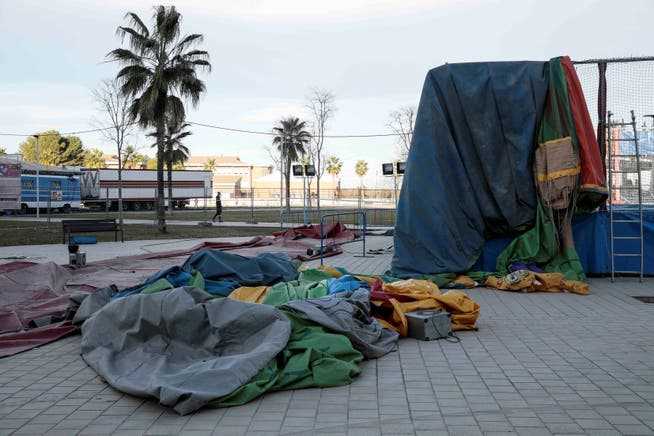Seven children die in two bouncy castle accidents within three weeks. An accident prevention expert explains how to avoid such tragedies.
In front of Hillcrest Primary School on the Australian island of Tasmania, many people have deposited flowers and teddy bears in memory of the deceased children.
The children jump, romp and also have plenty of space. Inflatables are the absolute highlight for children at events and birthdays. The inflatable rubber castles do not look dangerous at first glance.
But now there have been two tragic bouncy castle accidents with fatal consequences within three weeks. In the Australian state of Tasmania, Hillcrest Elementary School held a Christmas party including a bouncy castle. But suddenly the castle was torn into the air by a violent wind. According to eyewitnesses, several children fell from a height of up to ten meters. Six children did not survive the fall.
Just 21 days later, the next accident occurred in Spain. An eight-year-old girl died on Wednesday in the hospital in Valencia, according to the state television broadcaster RTVE and other Spanish media, citing the authorities.
Bouncy castle accidents in recent years
dho. · The accidents in Australia and Spain are anything but isolated. In Australia, a non-anchored bouncy castle cost an eight-year-old her life back in 2001. In Estonia, too, a bouncy castle was thrown meters high into the air in 2015, killing two children. A year later, a seven-year-old with a bouncy castle fell down a hill in Essex, UK. The little one did not survive the accident. In a similar accident, two children died in China in 2019. Six months ago, a bouncy castle with more than 100 children on it was torn into the air in Iceland. Seven people were injured – one child even had to go to the intensive care unit. According to the operator, the bouncy castle was firmly anchored. Children in China experienced similar moments of shock shortly before Christmas when the rubber castle was hit by a gust of wind.
Shocking seconds: a gust of wind blows a bouncy castle over the square # bouncy castle #accident #wind #xianning #China #KameraOne pic.twitter.com/TODVSRTVWH
– KameraOne German (@kameraone_deu) December 20, 2021
The accident occurred on Tuesday evening at a fair in the municipality of Mislata, a suburb of the Valencia metropolis in eastern Spain. As in Australia, a violent wind tore an inflatable castle into the air in Mislata. As a result, numerous children fell from a height of several meters. A total of nine of them had to be taken to hospital with some serious injuries.
The Mislata community ordered a three-day official mourning until Friday and canceled all festive events for the next few days. «There are no comforting words, a real drama. A very sad day for Mislata, ”wrote Mayor Carlos Fernández Bielsa on Twitter on Wednesday.

An eight-year-old girl was killed in the bouncy castle accident in the Spanish municipality of Mislata.
When the wind is strong, it’s over in Switzerland
What should the organizers have done differently? The NZZ asked the Advice Center for Accident Prevention (BfU) what to consider when building a bouncy castle:
Anyone who wants to build a bouncy castle in Switzerland outside of the private sphere always needs a permit. That also applies to temporary pleasure, says BfU media spokesman Nicolas Kessler. In addition, the applicable series of standards SN EN 14960 “Inflatable play equipment – safety requirements and test methods” must be respected. According to Kessler, this describes in great detail how the inflatables must be anchored. Even the angle is fixed. A temporary bouncy castle in your own garden does not require a permit, nor is it subject to the applicable standard, according to Kessler.
For public bouncy castles, however, outdoor installations are only possible as long as the wind speed is less than 38 kilometers per hour, says Kessler. It should also be noted that non-permanently installed bouncy castles and other inflatable play equipment require the presence of a supervisor during operation, as stated in the standard.
It is not known which guidelines apply in Australia and Spain to inflatables. However, the BfU knows that such tragedies have not yet occurred in Switzerland.
with agencies
